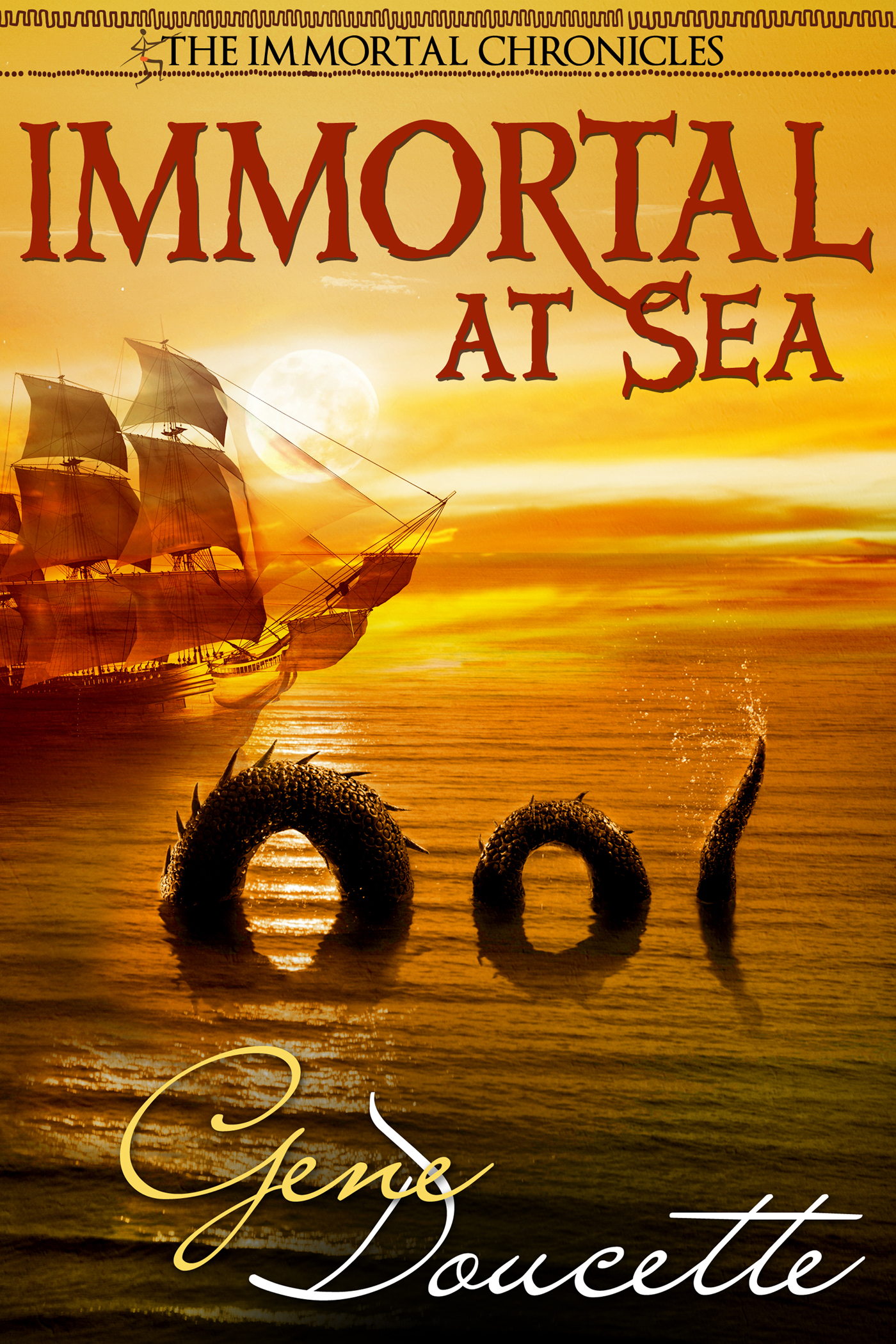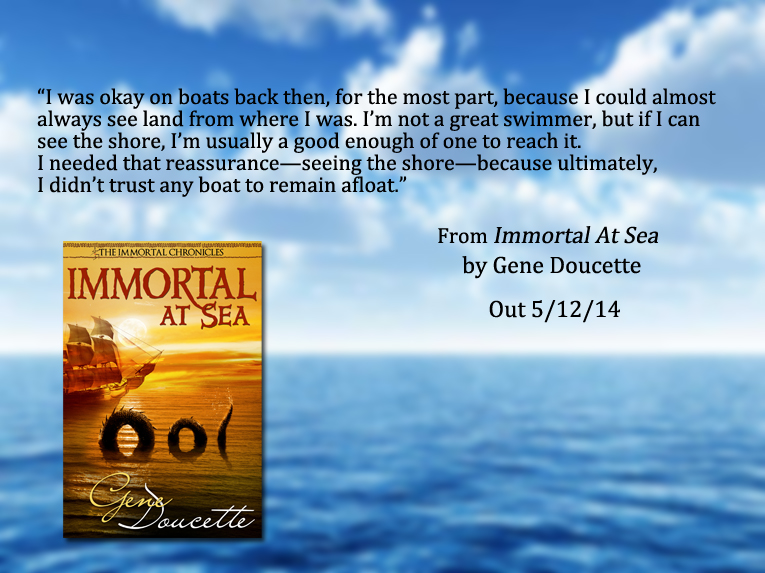Immortal At Sea excerpt
A sample
 Providing an excerpt of a short story seems a bit dangerous, because after all the story itself is only about 12,000 words long, so giving out a thousand of them means I’m giving out about 8% of the story.
Providing an excerpt of a short story seems a bit dangerous, because after all the story itself is only about 12,000 words long, so giving out a thousand of them means I’m giving out about 8% of the story.
But what the heck, here’s a sample anyway. Below, Adam is talking about sea serpents.
* * *
I’ve had arguments about this before. Whales, I’ve heard. Whales, and giant squid, and seals and all of that, and I’m willing to put my bet down on at least one or two of the things I’ve seen on the water being attributable to something mundane. But I have also seen sea serpents with my own eyes.
The first time was when I was a Carthaginian merchant. I had a small fleet of ships that operated across the Mediterranean, moving goods from the African coast to Greece and the safer ports of the Roman Empire. It was probably my first really successful business enterprise, and it only ended because it’s always been hard for me to settle down too long before people start to worry about the fact that I haven’t aged.
I only very rarely rode my own boats. The whole point of being a merchant is that you get to hire other people to do unpleasant things like combat nature in an environment humans aren’t really supposed to occupy, which is how I feel about the surface of large bodies of water. (Also, the tops of mountains, and the moon.) I was on this trip because it was destined for the Greek coast and I had business in Athens involving a religious cult that liked to worship me from time to time. (Long story.)
The boats moved across the sea through a combination of wind and rowing. The sails were square-rigged and relied much more on favorable wind currents than the modern fore-and-aft rigs everybody uses now. We planned the market schedule around favorable winds because rowing was an enormous pain in the ass.
The captain, whose name I can’t recall, was a Hebrew whose personality was the kind of mixture of scrupulous honesty and degenerate violence that makes for a good sea captain. He was the one who put a name to the thing in the water.
We were roughly halfway across the sea when we lost the wind. In Atlantic crossings (later, when people started crossing the Atlantic in ships) these are called doldrums, but on the Mediterranean we called it whatever curse word we had in whichever native tongue we preferred, and then we pulled out the oars.
Well, I didn’t. I watched. Because I owned the thing. And since there was no below-deck to speak of other than the hold where the supplies were, I had nothing much else to do except stand next to the captain and look out over the still waters of the sea, occasionally check in on the two boats behind us—which I also owned—and listen to the drum. One of the sailors manned the drum from the prow, pounding a rhythm the oarsmen were trained to follow. It was animal hide pulled over the mouth of a barrel, and it made for a deep bass that reminded me of at least one or two animal sacrifices from more savage days.
Some time passed in which we did little more than listen to the grunt of the oarsmen and the drumming, when a cry went out from one of the sister ships.
“What is it?” I asked the captain.
He squinted at the trailing vessel. “Is that the Assyrian? Pah.” He spat, as one did. “He is an idiot. Who cares?”
My vessel captains were unreasonably competitive with one another, something that was not obvious unless at sea with them. Ashore, they acted quite comradely.
The captain cupped his hands around his mouth to shout. “Did you drop something? Go back and get it! We will wait!”
A second later, a torch was lit on the other ship. The Assyrian captain performed an up-and-down sweeping motion with the flame, then turned to the third ship, trailing behind both of us, and did the same. Then he doused the torch.
“What does that mean?” I asked.
The captain turned pale.
“Drop oar!” he commanded. “Stop the drum! Run still!”
The first mate silenced his drum and repeated the order. All the sailors, as one, pulled their oars in, stowed them on the deck, and then fell to their knees and covered their heads. Entertainingly, it looked as if they were bowing to us.
“What—”
“Shh!” the captain silenced me. He was listening to the sea, as much as it was possible to do such a thing when not in the water.
I looked at the other ships and saw they were doing the same thing: oars in, hiding on the deck.
Then I heard something. At first I thought one of the other ships had failed to silence their drummer, but the faint thrumming wasn’t coming from above the water, it was from beneath the surface, as if the sea had developed a heartbeat.
The captain stepped to the railing of the foredeck and peered over into the water, looking for whatever it was that made the noise. He gestured me over, and pointed.
A terrible beast was moving below the surface. It was serpentine in nature, if not in size. It was easily the largest animal I’d ever seen. (I had seen larger trees, but for the most part they didn’t move.) It slid through the water the same way a snake might across land: back-and-forth sideways motions. It crested twice, a spiny back that rolled over the surface.
I saw the head only once, briefly, on the second circuit. It was a little like a horse’s head, if the horse had a head the size of an elephant. The heartbeat—if that was what it was—got louder on each close approach, but never changed tempo.
And then it was gone.
For close to an hour we remained silent and motionless on the water, just drifting and hoping it didn’t come back. Then the captain gave the all clear, the drumming resumed, and the sailors got to rowing again.
I asked the question that had been on my lips the entire time. “What was that thing?”
“It is tanakh,” the captain said. “And when you next speak to us about our commission you remember the risks we face out here.”
* * *
Immortal At Sea debuts 5/12/14
I decided I had to have a publication date formalized. I was talking to a reviewer friend (her review should be posting shortly) about this and promotion in general, and she suggested I put together a “graphic teaser”, to which I replied, “a what again?”
Folks, I’m on Tumblr, which already means I’m further along the social media ladder than a whole lot of people my age. But I don’t know what a graphic teaser is, why one would make particular sense for Tumblr, or how to make one.
“Just take an ocean shot, add a quote and the book cover and you’re all set,” she said. Then helpfully added, “like this.”
To this I said, “but I can’t do that.” I don’t know how she did that, I don’t know how I could do that, but there are people in the world who can do that in about five minutes, and bless them for it.
Meanwhile, I’m going to share the above image, continue to feel very old, and call it a day.


I’ve gotta meet Adam. lol
Adam hears that a lot. He does have a twitter account if you want to interact with him. If he’s sober he usually answers. @adamtheimmortal